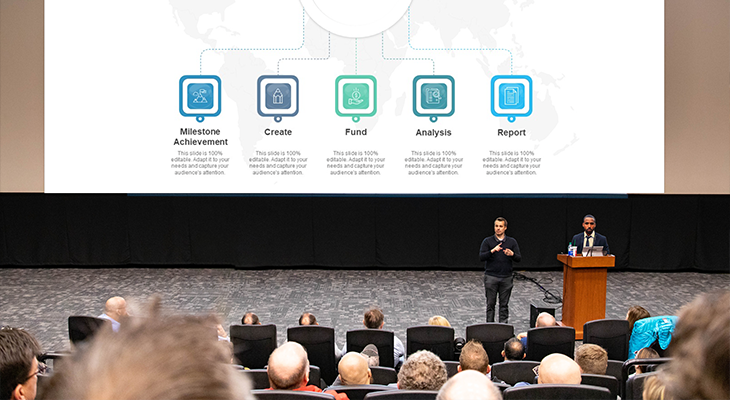Corporate Services
Diversity, Equity, Inclusion, and Accessibility (DEIA) matters in business. You can attract talent and improve your DEIA, corporate communications, and agility with Sorenson’s sign language interpreting services.
Business ASL Solutions
Sorenson’s ASL interpreting solutions are an essential component of corporate communications that support interactions between Deaf and hearing staff, candidates, clients, and partners. Today’s most in-demand employees and partners consistently report that employee experience and DEIA are important to them, so they need to be a corporate priority to attract and retain the best people and relationships.
Corporate Sign Language Interpreting Solutions
On-site Interpreting
Optimize your corporate communications experience with on-site business ASL interpreting. Dedicated interpreters provide face-to-face support to express nuanced communication with no delay. In-person interpreting allows maximum engagement and participation and is the most conducive to relationship-building.
No risk of internet connection issues or frozen video feeds.
Interpreter observes unspoken cues for more accurate communication.
A deeper level of communication, with interpreter blending into conversation.
No delay of internet video transmission for smoother on-site communications.
Video Remote Interpreting (VRI)
VRI offers you the convenience of scheduling sign language interpreting over video to connect with clients, prospects, job candidates, and employees.
Sorenson’s reliable, accurate ASL interpreters enable seamless in-person or virtual discussions between Deaf and hearing participants with an interpreter over an internet connection. You can even select interpreters with background knowledge of your industry or subject matter. For staff meetings, candidate interviews, and employee-supervisor discussions, VRI offers convenient communication between Deaf and hearing parties.

Request an interpreter familiar with your industry, terminology, or regulations.
Anytime interpreter access without the cost of employing interpreter full-time.
Interpreters available whenever you need them for in-person or virtual meetings.
Inclusive of diverse employees and customers for understanding and collaboration.
Frequently Asked Questions
Find answers to frequently asked questions about sign language for business.
Businesses that account for American Sign Language (ASL) users extend their ability to communicate with Deaf candidates, employees, and clients. Access to an in-house ASL interpreter or a professional third-party interpreter greatly improves interaction with Deaf customers and job candidates as well as supporting Deaf and hearing employees in any business setting. Businesses that consider and adapt to language needs foster a welcoming environment and sense of belonging for all employees and clients. It’s a marker of commitment to diversity, equity, inclusion, and accessibility (DEIA) as well as business savvy to embrace varied perspectives.
All U.S. businesses are subject to The Americans with Disabilities Act (ADA). The act prohibits discriminating against people with disabilities, including the Deaf and hard-of-hearing. Companies with 15 or more employees must provide equal opportunity to apply for, interview for, and maintain a job. That includes supplying an ASL interpreter if a Deaf candidate or employee requests it. Businesses may enlist their own ASL interpreter staff or outsource through a reputable third-party, such as Sorenson.
Businesses can’t refuse an American Sign Language (ASL) request. Doing so discriminates against the Deaf and hard–of–hearing who use ASL to communicate—a violation of the Americans with Disabilities Act (ADA). This applies to direct requests for interpreting service as well as interactions with interpreters the business does not arrange itself. For example, if a caller using Video Relay Service calls a business, the business can’t refuse the call.
Any kind of business can use ASL, and an increasing number of businesses do. Fun fact: the first ASL-centric Starbucks coffee shop opened in 2018, catering specifically to the Deaf and hard-of-hearing. All businesses with 15 or more employees must meet requests for Deaf or hard-of-hearing accommodation under the Americans with Disabilities Act (ADA).
Offering ASL for business doesn’t have to be complicated. Sorenson conveniently and affordably supports in-person and remote interpreting services across the country with the largest highly trained private interpreter workforce in the world.
The ability to communicate in sign language offers the same benefits as any other language support; it facilitates communication and understanding. Embracing a multilingual approach also promotes a corporate culture of inclusion, diversity, and respect.
Whether a business encourages staff to learn sign language, employs in-house ASL interpreters, or uses third party on-site or remote interpreting services, ASL compatibility makes it more accessible to customers, employees, and partners.
Get More Information About Our Services
Complete this form and we’ll answer any questions or set you up with service.

